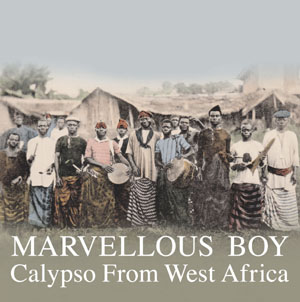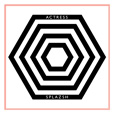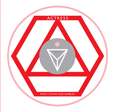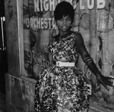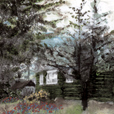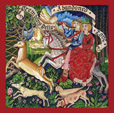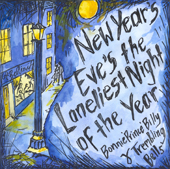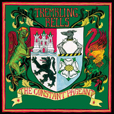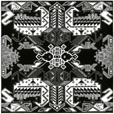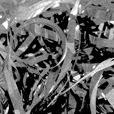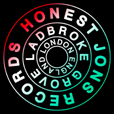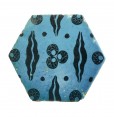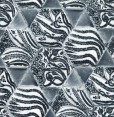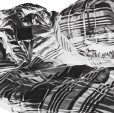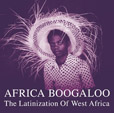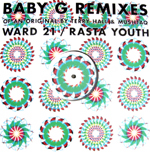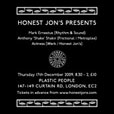Your basket is empty

Marvellous Boy is the West African counterpart of the 1950s Soho scene of our series London Is The Place For Me. Calypso, highlife and jazz, brimming over with lust for life, topicality, and extravagant creativity.
Dazzling melds of classic Detroit, grime, dubstep, speed garage, Paisley rock, synth-wave and the rest, with none other than the man not-himself crowned king.
Three exclusives trailering the Splazsh album, including a carnivalesque house banger from Zomby. Out Detroit, UK bass science and UK funky, cold wave and Kraftwerk… a London thing, mongrel and dashing.
An immersive, slashing, ecstatic thumper, just about getting Mars on the radio; and a kind of unhinged marimba and thumb-piano variation, grubbing around manically in half-memories of African polyrhythm.
The implacable, alien Son Of Sleng Teng — a beast of of a tune, lumbering and snuffling, one-of-a-kind — bleeping, buzzing, knocking, dripping, reverberating… and unresolved in nine minutes.
Fired-up, originary African pop, conjuring the Congolese rumba from imported Latin 78s — with thumb pianos, kazoos, banjos, bottles, violins, and irresistible little songs about pimps, dope, clubbing, sex, death.
‘Jesus fucking shit! These jamz claw so hard at the tatties below methinks the Lord misnamed them, having intended to say trembling BALLS’ (Will Oldham). ‘My kind of band… Highly recommended’ (Joe Boyd).
‘brilliant… concise, deeply romantic, totally original ****’ (Mojo); ‘freewheeling and delightfully quirky ****’ (The Guardian); ‘CD Of The Week… terrific’ (The Observer); ‘like nobody ****’ (Sunday Times).
A terrific, bountiful seasonal single — with Bonnie Prince Billy in his cups on one side, and Mike Heron from The Incredible String Band on the other, with a Boxing Day ghost story. Beautifully sleeved, limited.
‘New levels of excellence… a poetic incantation of British identity far brighter than Michael Gove’s proposed GCSE history syllabus *****’ (The Sunday Times). ‘Magnificent ****’ (The Guardian).
Forgotten masterpieces, out-of-this-world improvisations from the 1920s; and dazzling commissions by Sir Richard Bishop, Six Organs Of Admittance and co. ‘Dextrous, frenzied, fearless… awesome’ (Plan B).
Two sick techno killers, stalking the perimeters of noise; and generous excerpts from a soundtrack to Dreyer’s Vampyr, with Sun Ra in its marrow, alternately driving and motorik, off-the-wall, lost in space.
Mark Ernestus / DJ Pete / Sleeparchive
Thursday May 7 2009, Plastic People, London
Honest Jon's Records
Honest Jon’s presents Mark Ernestus from Rhythm And Sound spinning 45s alongside DJ Pete from Substance and Scion Versions, with a live set from Sleeparchive.
‘Terry Hall has returned with his best work in decades… a daring, thoughtful set’ (The Guardian); ‘***** the real message lies in the boldness of its musical vision… world music album of the year’ (The Times).
‘Recorded as Blair and Bush were conspiring to strike fear and loathing into the region responsible for these grooves, it’s every bit as topical as Ghost Town, as eerie as War Crimes’ (Time Out).
Nominally this is a collaboration between Terry Hall and Mushtaq, once of British-Asian pioneers Fun-Da-Mental — but ‘everybody we worked with had a story to tell,’ recalls Terry Hall, ‘and their stories became part of the record. We were blessed with the range of people we found.’ A Tunisian singer, a Syrian flautist, an Egyptian who had settled in Iraq, a twelve-year old Lebanese girl, a blind Algerian rapper from Paris, a choir of Polish gypsy refugees brought in from a social club in Leytonstone, the clarinettist who recorded the original Pink Panther theme; singers in Hebrew, English, Arabic, Romany. ‘Everybody had a sense of something in common in their minority and oppression and struggle. In the end, it felt more like we were editing a film than making a record.’
A year in development, the album is also a powerful reflection of the time in which it was made and the storm that was gathering: Bush and Blair were intent on Armageddon in Iraq; in the refugee camps on the West Bank, atrocities were being committed on a daily basis; closer to home, sections of the British media used the fear of terrorism to whip up a hate-fuelled campaign against asylum seekers and other minorities pushed to the margins of society.
‘What was going on as we were making the record seemed to make it more and more political. We had something to say, but we wanted to avoid being worthy or preaching and keep the words to a minimum.’
Pure worries from Leipzig — three club burners steeped in Detroit traditions, distilling the explorations in collective, nervy hypnosis of KM live sets. As the music slowly unfurls, there he is at every turn, subtly tweaking its parameters, redistributing its weight, pricking its grooves into a state of utterly infectious perpetual movement.
The two visions of Chilazon track opposite pathways: the first is twelve minutes of gorgeous, dubwise, aquatic techno, spattered with kicks and razor-sharp hi-hats, and smeared with ghostly echoes; then a terse mesh of broken drums, escalating to a quiet yet feverishly intense peak. Lanthanum is calligraphic swordplay, its toms and bass stabs warily circling one another in a graceful steppers’ dance, spaced-out and fathoms-deep.
Fierce, subtle music, radically strange and unafraid of the deep, but with a killer understanding of rhythm. Lush drum-machine nocturnes, gnarly electronica and glorious flowerings of zoned-out dubspace: an evolutionary music, continuously engaged with experimentation both in the studio and the club.
Whether prepared solo, or jointly with his spar Mix Mup, a Kassem Mosse recording is less of a stand-alone creation than the next thrilling installment of an unstoppable groove. True to form, Disclosure dazzlingly extends some of the most mystical, essential dancefloor-rooted music of the last decade, from dusty, dream-state techno on Workshop and Mikrodisko, to frazzled beatdowns on Trilogy Tapes and Nonplus.
Pedigree techno and house are the lifeblood of Disclosure, yet with something newly microscopic about them. Its mesmerising juggle of pointillistic percussion, melting-wax chords and fleshy bump’n’grind suggests biological processes at work, as if Mosse has zoomed right into the cellular metabolism ticking away at the core of the music.
These textures are woven into some of KM’s richest and most emotionally complex material so far, constantly enlivened by forays into jazz, dub and beyond. Check the farty-bottom, broken-down, steel-pan minimalism of Collapsing Dual Core, just the job for coursing around Detroit in a car at night; and Phoenicia Wireless’ dastardly, intricate combination of glowering John Carpenter synths, heavy static and junked consoles on remote, as if the beats are fighting a wave of dirt, soot and fossilisation. The frantic, interstella tarantella of Galaxy Series 7; the wonky bump-and-hustle and heavy-lidded drama of Purple Graphene, to close.
Expertly pieced-together and paced, Disclosure brilliantly registers all the self-contained coherence and artistic authority of an album proper, yet shadowed throughout by the open-ended and questing spirit so vital to Mosse’s music. Its intimate enactments of non-closure, and its sense that anything could happen at any moment; its thematic play between excess and incompleteness, babble and tongue-tied stutter, and-you-don’t-stop grooving and entropy, wobble and the pause-button.
Trash and ready in a spiffy Bankhead sleeve, too.
Double bim. Bim, bim.
Moritz from Basic Channel and Rhythm And Sound, alongside Vladislav Delay (Chain Reaction) and Max Loderbauer (Sahko): a dream crossing of classic Berlin techno, On-The-Corner Miles, Larry Heard, and Can.
At its most open, shifting and expressive to date. For all the music’s complexity and deep coherence, freedom is the key. At times it grooves hard; at others it’s lush, romantic.
With Tikiman and Marc Muellbauer.
A handful of LPs signed by Moritz!
At its darkest and most driving. The group is clear and unanimous — this is their best yet.
Meditative, absorbing dance music in true Moritz style — at times seemingly transfixed by its own elements, and minimal almost to vanishing-point, but quickly back ticking, kicking and amassing.
Tony Allen, Max Loderbauer and Moritz von Oswald; mixed by Ricardo Villalobos.
Rocking the party and ramming the dancefloor is the first priority of this review of Latin styles in classic West African dance music, as it emerged with 1950s anti-colonialism, and ran on gloriously into the 70s.
The second son of King Jammy, Trevor James aka Baby G is at the cutting edge of the new wave of dancehall producers. Jammy’s stalwarts Ward 21 and newcomers Rasta Youth on the mic.
